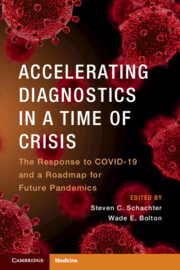 Accelerating Diagnostics in a Time of Crisis
Accelerating Diagnostics in a Time of Crisis Book contents
- Accelerating Diagnostics in a Time of Crisis
- Accelerating Diagnostics in a Time of Crisis
- Copyright page
- Dedication
- Contents
- Contributors
- Foreword
- Preface
- Acknowledgments
- Introduction
- Chapter 1 Early Detection, Response, and Surveillance of the COVID-19 Pandemic Crisis
- Chapter 2 Immunology of COVID-19 and Ineffective Immunity
- Chapter 3 Clinical Management: A Roadmap Based on One New York City Hospital’s Response to the COVID-19 Pandemic
- Chapter 4 Contribution of RADx® Tech to the Rapid Development of COVID-19 Diagnostic Tests
- Chapter 5 Coordination of Resources for the Manufacturing and Deployment of COVID-19 Diagnostic Assays
- Chapter 6 Quality and Risk Management Processes for Diagnostic Assays during an Emergency Pandemic Response
- Chapter 7 Development of Assays to Diagnose COVID-19
- Chapter 8 Laboratory Verification and Clinical Validation of COVID-19 Diagnostic Assays
- Chapter 9 Importance of Timely Sequencing, Tracking, and Surveillance of Emergent Variants
- Chapter 10 The RADx® Regulatory Core and Its Role in COVID-19 Emergency Use Authorizations
- Chapter 11 Commercialization and Market Assessment of COVID-19 Assays
- Chapter 12 Testing Strategies to Mitigate COVID-19 Disease Spread
- Chapter 13 A Pandemic Not Just of Infection but of Inequality: The Social Impact of COVID-19
- Chapter 14 Summary and Path Forward for Future Pandemics
- Index
- References
Chapter 4 - Contribution of RADx® Tech to the Rapid Development of COVID-19 Diagnostic Tests
Published online by Cambridge University Press: 06 January 2024
- Accelerating Diagnostics in a Time of Crisis
- Accelerating Diagnostics in a Time of Crisis
- Copyright page
- Dedication
- Contents
- Contributors
- Foreword
- Preface
- Acknowledgments
- Introduction
- Chapter 1 Early Detection, Response, and Surveillance of the COVID-19 Pandemic Crisis
- Chapter 2 Immunology of COVID-19 and Ineffective Immunity
- Chapter 3 Clinical Management: A Roadmap Based on One New York City Hospital’s Response to the COVID-19 Pandemic
- Chapter 4 Contribution of RADx® Tech to the Rapid Development of COVID-19 Diagnostic Tests
- Chapter 5 Coordination of Resources for the Manufacturing and Deployment of COVID-19 Diagnostic Assays
- Chapter 6 Quality and Risk Management Processes for Diagnostic Assays during an Emergency Pandemic Response
- Chapter 7 Development of Assays to Diagnose COVID-19
- Chapter 8 Laboratory Verification and Clinical Validation of COVID-19 Diagnostic Assays
- Chapter 9 Importance of Timely Sequencing, Tracking, and Surveillance of Emergent Variants
- Chapter 10 The RADx® Regulatory Core and Its Role in COVID-19 Emergency Use Authorizations
- Chapter 11 Commercialization and Market Assessment of COVID-19 Assays
- Chapter 12 Testing Strategies to Mitigate COVID-19 Disease Spread
- Chapter 13 A Pandemic Not Just of Infection but of Inequality: The Social Impact of COVID-19
- Chapter 14 Summary and Path Forward for Future Pandemics
- Index
- References
Summary
Rapid Acceleration of Diagnostics (RADx®) Tech was the key diagnostics component of a three-pronged national strategy, including vaccines and therapeutics, to respond to the COVID-19 pandemic. Unprecedented in the scale of its mission, its budget, its accelerated time frame, the extent of cross-government agency collaboration and information exchange, and the blending of business, academic, and investment best practices, RAD Tech successfully launched dozens of US Food and Drug Administration Emergency Use Authorization diagnostic tests, established a new model for rapidly translating diagnostic tests from the laboratory to the marketplace, and accelerated public acceptance of home-based diagnostic tests. This chapter provides an overview of the processes utilized by RADx Tech during the COVID-19 pandemic to improve clinical laboratory tests and identify, evaluate, support, validate, and commercialize innovative point-of-care and home-based tests that directly detected the presence of the severe acute respiratory syndrome coronavirus 2 (SARS-CoV-2) virus.
Keywords
- Type
- Chapter
- Information
- Accelerating Diagnostics in a Time of CrisisThe Response to COVID-19 and a Roadmap for Future Pandemics, pp. 74 - 87Publisher: Cambridge University PressPrint publication year: 2024


